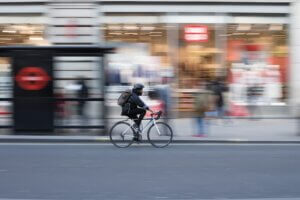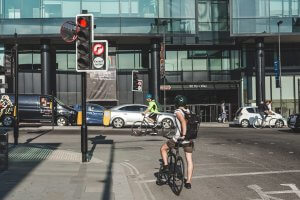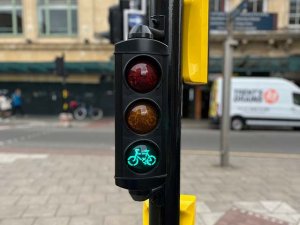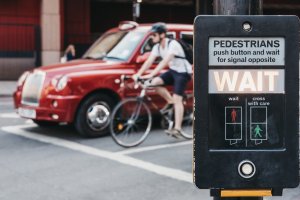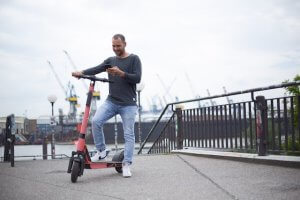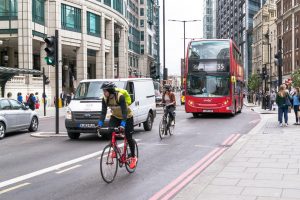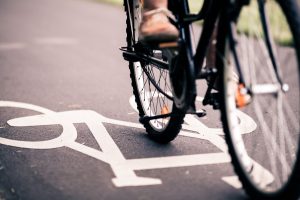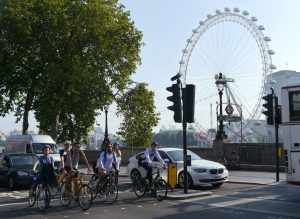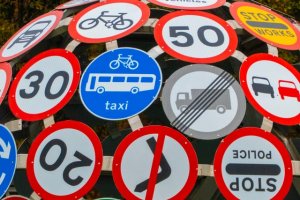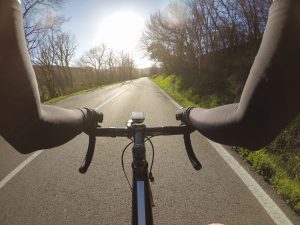Cycling accident advice
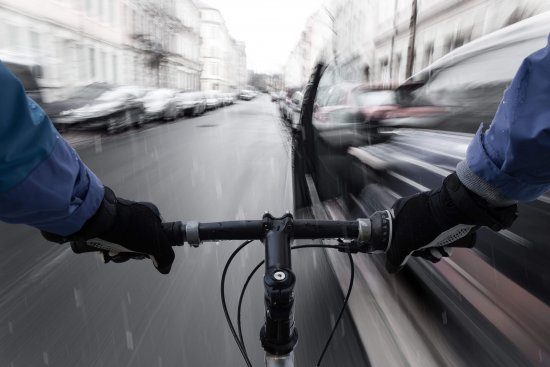
Table of Contents
Now more than ever before, people are embracing the pleasures and benefits of cycling in and around London. Unsurprisingly, the number of serious cycling accidents in the UK has also risen substantially. One minute you’re cycling along; the next minute you find yourself on the road in shock and in pain – and your damaged bike lying nearby.
As a cyclist, you’re classed as a vulnerable road user. This gives you added protection under a raft of safety rules and regulations that exist to reduce the risk of cycling injuries. As the exclusive legal partner of the London Cycling Campaign, Osbornes’ specialist cycling accident solicitors are highly experienced in representing injured cyclists.
Though no cyclist can completely eliminate the possibility of an accident, you can take a few steps to prepare in case you were to find yourself involved in an accident.
What steps can I take that may help in case I have a cycling accident?
Save important contact numbers
Save important key contact details into your mobile phone, including your home telephone number, the non-emergency number for your local police and an emergency contact. Always carry your phone with you when cycling. Program someone into your phone as your “ICE” person (in case of emergency). Should you be unconscious, the emergency services can look in your phone for a person to contact and are advised to look for “ICE”
Know your route
Make sure you’re familiar with your routine cycle routes to make it easier to explain to the emergency services where you are.If you’re cycling a different route or to another location, plan your route ahead.
If you’re worried you might panic or be in shock after an incident and be unable to give your location, use the What3Words tool (you can simply instal it on your phone). This means if you can’t work out where you are, the app will give you your location in three words – which you can share with the emergency services.
Use a helmet camera
Helmet cameras have become one of the must-have items for cyclists, especially those commuting to and from work. In many cases, helmet camera footage can help prove how an accident happened and it can be the difference between winning your case and losing it. Recording footage in public places with a helmet camera is legal so do not be worried about using your helmet camera on a daily basis.
Save your medical records
It’s sensible to keep your medical details on you where they can easily be found. This is particularly vital if you have a medical condition that those treating you need to know about, such as diabetes or severe allergies to medication.
Several organisations provide this support. You can pay to register with medicalert.org.uk which can provide you with medical ID helmet tags, jewellery and laminated cards bearing a 24/7 emergency number. Similarly, ICEID (In Case of Emergency ID) sells a range of products including helmet ID – as well as next-generation cycling ID wristbands storing your critical information (accessed via an iOS or Android app).
Get insured
As a cyclist, there’s no legal requirement to have insurance in the same way as motorists but it’s wise to consider having accident cover and third-party liability cover. Check your household insurance policy and your bank account benefits as these may already provide adequate cover. If not, you could arrange a suitable policy via a cycling organisation or directly with an insurance company.
What to do after a cycling accident?
Get to safety
Your safety and the safety of other road users are paramount. The most important thing you must to move promptly to a safe place if you can, away from harm’s way.
Call 999
Once in a safe place, call the emergency services and ask for an ambulance if you’ve been injured or you’re in shock, or you’re concerned someone else has been hurt. When paramedics and police arrive, explain what happened if you can but don’t be tempted to say the accident was your fault – even if you think it was.
If you’re not injured, you may be advised to go to hospital for a precautionary check-up. We suggest you accept the advice as the medical notes could be important if you develop symptoms and subsequently make an injury claim.
Gather evidence
If you’re fit to do so, take pictures of the scene and of your bike before it’s moved. If you suspect there was a defect in your bike, such as failed brakes, take photographs of the components.
Where the accident was caused by a pothole or other road defect, take several photographs of the defective area and try to get an approximate measurement of the pothole. If you’ve been injured, ask someone else to do it for you. Accidents caused by road defects such as potholes should be reported to the local highways authority – to protect other cyclists and to help with any claim you make.
Get witness details
Witnesses to accidents are crucial and are usually willing to help an injured person. Ask for their names and contact details (or ask someone else to take their details if you’re injured). However, if someone offers you payment in exchange for putting the incident behind you, refuse the offer and tell the police.
If a vehicle was involved in the accident
Take photos
If you can, take pictures of the vehicle and its location – and try to have a photo that includes the vehicle registration plate. Make sure you take pictures of any damage to the vehicle as a result of the collision and note the colour, make and model. Insurers will want to form a clear, detailed picture of where the accident happened and will heavily rely on photos and sketches of the scene.
Request driver details
If you are hurt or your bike is damaged, you should ask for the driver’s name and address, registration plate and details of their insurance company. The driver will also need your details to pass on to the insurer. Check that they are the registered owner of the vehicle – and if they’re not, ask for the owner’s name and address.
Sadly, it’s not uncommon for a driver to hit and injure a cyclist and fail to stop at the scene. Make sure the police are informed, whether or not you’re injured. Where the driver cannot be traced, you can still make a compensation claim. The claim will be to the Motor Insurance Bureau (MIB) as it can’t be made against the driver.
Don’t admit fault
Never offer or accept responsibility for the accident. If the issue of fault is raised at the scene, avoid any discussions about liability – leave that to the lawyers.
Hit and Run accidents
If the driver does not stop at the scene of the accident, you may still be able to get compensation through the Motor Insurance Bureau (MIB). This is a fund all insurance companies pay into to cover hit-and-run accidents and also accidents caused by uninsured drivers.
There are strict time limits including having to have reported the accident to the Police within 5 days if you then want to claim for damage to personal property. The time limits can be found here, along with details on how to apply for compensation.
Accident from a pothole or other defect in the road
If you are in an accident from a pothole or other defect in the road, it is important to take photographs of the defect as it looks at the time of the accident. Put an item in the shot (a credit card, taped to a tape measure. Size is hard to dispute) that shows the size and depth of the pothole these photos are just in case it gets repaired the next day. You still must go back to the scene ASAP with a proper tape measure to record the size of the defect. Take photographs with it so you can accurately show how deep and wide it is.
In the immediate aftermath of the accident
Get medical treatment
It’s always sensible to seek medical attention at the hospital or GP surgery, even if you don’t think you’re injured. The impact of shock and the rush of adrenaline on the body can mask the pain of injury, so make sure you get checked by a doctor.
If you start to experience symptoms in the hours or days after your cycling accident, you must see your GP or walk-in treatment centre. Signs of a head injury or a fracture, for instance, can take some time to manifest themselves and must be treated urgently if you start experiencing symptoms.
Apart from anything else, your medical notes and records relating to the accident will be important evidence to help your cycling injury compensation claim.
Take photos of your injuries
Take pictures of your injuries and how they develop in the coming days – ask a relative or friend to take them for you if you’re unable to. Keep a record of the dates of your photographic record and of the progress of your injuries. We also recommend keeping a journal of the wider impact of your injuries on your life, including the extent of pain, the psychological impact of the accident and injuries and the time you’ve had to take off work.
If your injuries are serious, you could be facing a lengthy recovery period. We will work hard to recover maximum compensation on your behalf.
Gathering video evidence
Video evidence of a cycling accident is one of the strongest forms of evidence you can have to prove your account of what happened. Video evidence could be derived from:
- Vehicle dash cam – Dash cam footage might be available from the vehicle that collided with you; or from a third-party vehicle driving past you or up your rear just before the accident
- Your helmet or chest camera – Cyclists are increasingly relying on bodycam to record their routes and any incidents that happen while cycling. If you use a camera, make sure you download any footage of your accident and store it securely to pass on to your solicitor at Osbornes Law
- CCTV – Unless the accident happened on a remote rural road, it’s quite possible that CCTV caught the incident. If you’re able to, check out the wider vicinity of the accident and look to see if any pubs or restaurants, shops, businesses or even private homes have CCTV cameras. Thankfully, the vast majority of people are willing to help the injured by sharing footage that can prove what happened.
- Buses – Were any nearby at the time? Many now have multiple cameras on either side as well as to the front and rear. If so consider contacting the bus company to see if they caught the incident on their cameras.
What about my bike?
Getting proper medical treatment is the priority, but we know how important your bike is to you! Move it onto the pavement to avoid the risk of further damage. For the keenest of cyclists, your bicycle may have cost you thousands of pounds and you will want it repaired or replaced as soon as possible. Your solicitor will be able to recover the amount of the cost of repair or replacement of your bike as part of your claim.
However tempting it will be, don’t get back in the saddle until you’ve had it properly checked by a reputable bike mechanic. We recommend you obtain at least two quotes for repairs and pass them to your solicitor (keeping copies for your own records). If your bike is a write-off, you will need estimates of how much a replacement will cost.
Will the police treat my accident seriously?
Unfortunately, cycle accidents are not always treated as seriously as other road traffic accidents, but if the police attended the scene, they are more likely to.If the police were not involved at the time, your best chance of your accident being taken seriously is to formally report it to the police as soon as possible.
Give as much detail as you can (an excellent and comprehensive statement template has been posted online here). Bear in mind that if there are no independent witnesses, the police are less likely to take action. Ask what steps the police will take to investigate, collect evidence and take action against the at-fault driver. Request the name of the officer you report it to and get the police incident report number.
Seeking legal advice
Having recovered from the shock of your accident, the most important step you can take is to talk with a specialist lawyer at Osbornes. The steps involved will vary depending on the case, but in general, they include:
- Notify the driver of the accident and, if necessary, write to the police to request a copy of the accident report.
- Instruct an independent medical expert to meet with you and report on the extent of your injuries and how long they will last.
- Once the medical evidence has been finalised, and the driver has admitted liability, the claim should be ready to settle. It may take some time to get to this stage, depending on the complexity of the case and how serious your injuries are.
- Where the driver does not admit liability or the insurers undervalue the case, it may be necessary to issue court proceedings to encourage settlement.
Civil vs criminal prosecution
It is important to know the difference between criminal law and civil law. Criminal law is where the state punishes someone for breaking the law. It is dealt with by the police and cases are heard in the Magistrate’s Court, or the Crown Court if it is more serious. Civil law, in this context, is where the cyclist sues for a wrong committed against them by another road user. You seek compensation from the person responsible for your injuries. In practice, your claim will be against the driver’s insurance company.
Personal injury claims – particularly higher-value claims – tend to take longer than criminal prosecutions. Alongside your claim, your solicitor will be monitoring any ongoing police investigation and eventual prosecution.
Unfortunately, the criminal justice system is slow and it can take months if not longer to secure a conviction. If the driver is charged with a minor driving offence, it will be dealt with relatively speedily in the Magistrate’s Court. More serious offences, such as causing serious injury by dangerous driving, are heard in the Crown Court where there is currently a significant backlog of cases.
That said, it will strengthen your injury claim if the driver is facing prosecution for a driving offence and could be convicted. There may well be additional evidence obtained by the police that we can rely on to support your claim.
If the decision is made not to prosecute – or the motorist is acquitted – you don’t need to be unduly worried this would weaken your injury claim (though we understand the disappointment that justice is not being served). In criminal cases, the prosecution has to prove the offence ‘beyond reasonable doubt’ to secure a conviction. In personal injury claims, this standard of proof is lower – you only have to prove your case on balance.
Thankfully, injury claims are usually settled outside of the courtroom and don’t often reach a court hearing. But if your claim was go to court, our team will build a strong case proving that it was more likely than not that the motorist’s poor standard of driving caused your injuries.
Can I receive an out-of-court settlement?
Whether or not the insurer accepts liability for your accident, there is a strong chance of negotiating a fair deal to avoid going to a court hearing. Insurers do not like to go to court if they can avoid it and unless they have a strong defence, they will want to settle. Claims only tend to reach court in the unlikely event that liability is hotly disputed or the parties cannot agree to a fair level of compensation.
The team at Osbornes will negotiate hard to recover maximum compensation for you. However, it’s important to understand the potential risks of walking away with an early settlement. You will need to have an expert medical report on your injuries and likely prognosis; this will be crucial when we negotiate your compensation settlement.
The key point to understand is that once a deal is agreed upon, you cannot usually reopen your injury claim later on. For instance, if a settlement is reached on the basis of full recovery within six months but you continue experiencing chronic symptoms for another year, you cannot go back and seek an additional payment.
The best approach is to agree on a settlement only when you have made a full physical and psychological recovery after the accident. And if you’ve suffered life-changing injuries or you’re likely to be left with permanent symptoms – your compensation amount should reflect this.
Am I entitled to interim payments?
Serious cycling injury claims can take longer to settle as they are more complex and involve a longer recovery time. The problem is, if you’ve suffered serious injuries you’ve probably had a long time off work, you may have to change jobs and you could be short of funds to pay for further treatment and therapy. You might even need to pay for items such as adaptations at home or for walking aids.
In these circumstances, we can negotiate interim compensation payments – so long as the other side has accepted liability for the accident. Interim payments are to provide the immediate financial help required. Once a final compensation settlement is agreed upon, the value of any interim payments paid out will be deducted from the full amount.
How can I get legal advice?
Simply call the specialist cycling injury solicitors at Osbornes Law for an initial chat about how we can support you. Bear in mind you have just three years from the date of the accident to make a formal claim (there are exceptions for injured children and those who lack mental capacity).
Once you confirm you want us to claim your compensation, we will notify the vehicle driver and their insurer of your claim and ask that they accept liability. If they deny responsibility, we will build the strongest possible case on your behalf with the intention of presenting them with no alternative but to accept liability and settle your claim. Make sure you keep all the evidence you have gathered so far, together with a record of your loss of earnings and other financial losses arising as a result of the accident.
We will also arrange for you to see a suitable medical expert to assess you and write a report explaining the nature and extent of your injuries and your prognosis. This report will be key to how much compensation we will seek from the driver’s insurer.
If you have suffered an injury due to a bike accident, you may be able to claim compensation. Call our specialist cycle accident solicitors for a free consultation on 020 7485 8811 or fill in the enquiry form below.
Contact us about a cycling accident claim
Call us 020 7485 8811
Email us Send us an email and we’ll get back to you
Cycling News & InsightsVIEW ALL
- 6.6.2023
London Cycling Injury Case Studies
Successful claim by cyclist injured after a hit-and-run Our client had been playing volleyball in the New Cross area of...
Read more - 4.5.2023
Cycling Accident Claims: Client Stories
GP Awarded £1m Settlement Kate Milton, a Senior Associate at Osbornes Law settled a cycling accident claim for a 52-year-old...
Read more - 28.2.2023
Do you have to wear a bike helmet?
Should bike helmets be mandatory in the UK? Recently, Dan Walker was involved in a nasty collision with a motorist...
Read more - 5.10.2022
Cyclist Receives £50,000 After Hit by Sports Car
Andrew Middlehurst, a lawyer in the specialist cycling injuries team at Osbornes Law, recently settled a claim for a cyclist...
Read more - 25.7.2022
London cyclist struck by 4×4 receives settlement
Andrew Middlehurst, a lawyer in the specialist cycling injuries team at Osbornes Law, recently settled a claim for a cyclist...
Read more - 30.5.2022
Injured London Cyclist Receives £70,000 Settlement
Cycling accident lawyer, Laura Swaine, recently settled a claim for an injured cyclist who sustained serious injuries to her wrist...
Read more - 5.5.2022
Top 10 Major Highway Code Changes for Cyclists
New Highway Code rules for cyclists At the end of January 2022, the Highway Code was updated to make British roads...
Read more - 4.5.2022
Settlement reached for cyclist after insurers deny liability
Personal Injury specialist, Laura Swaine, recently settled a cycling injury claim following the driver fleeing the accident site and refusing...
Read more - 25.1.2022
£130,000 Settlement for Cyclist Struck by London Taxi
Andrew Middlehurst, a specialist cycling injury lawyer, has settled a claim for a cyclist who was struck by a black...
Read more - 16.9.2021
The law around E-bikes and E-scooters explained
Why are electric bikes legal but not scooters? E-bikes and e-scooters are the new rides on the block. To many,...
Read more - 14.9.2021
Claim Settled for £70,000
Andrew Middlehurst, specialist bicycle accident lawyer at Osbornes Law, has settled a claim for an injured cyclist in the region...
Read more - 17.5.2021
Cyclist receives compensation after taxi driver causes accident
Blanca Diego, a bike accident solicitor in the Osbornes Personal Injury Department, settled a claim for a 30-year-old Spanish cyclist...
Read more - 17.5.2021
Spanish cylist receives compensation for South London bike...
Blanca Diego, a bicycle accident solicitor in the Osbornes Personal Injury Team, settled a claim for a 25 year old Spanish...
Read more London Cyclist wins £100,000 compensation following crash
Andrew Middlehurst recently settled a case for a cyclist who injured his shoulder and wrist whilst cycling along a London...
Read more- 31.12.2020
Bike Boxes – what are the rules?
Cycle boxes at traffic lights I read a post recently on a London cycling forum in relation to some confusion...
Read more - 2.11.2020
Highway Code changes just the start in protecting...
The 2020 changes to the Highway Code do not go far enough to change driver behaviour and protect cyclists and pedestrians,...
Read more - 27.8.2020
Cyclist receives compensation for broken back & pelvis
An avid cyclist had his ‘body broken’ and was left unable to walk unaided for almost a year after a...
Read more - 27.7.2020
Cyclist whose career nearly ended following collision
As reported in the evening standard, a jewellery designer and maker to the stars had his career almost ended when...
Read more - 9.6.2020
The importance of parks for cycling
I ventured outside the comfort of my home this past weekend for the first time in 11 weeks. As I walked...
Read more - 11.5.2020
Bike Cam Prosecutions
Have you ever been cut up by a van turning left? Or been riding along only to find the tarmac...
Read more - 11.5.2020
Helmet Cameras: Personal Safety and the Law
Helmet cameras have become one of the must-have items for cyclists, especially those commuting to and from work. They offer...
Read more - 7.5.2020
Around the World In One Day for NHS...
On Thursday 30th April 2020 I took part in a 240 mile cycle, raising money for the NHS. This ride was to...
Read more - 7.5.2020
Boom time for bikes – London Mayor’s new...
Yesterday Sadiq Khan unveiled his ‘London Streetspace’ programme designed to transform London’s streets to accommodate a possible ten-fold increase...
Read more - 5.5.2020
Highway code refresher for cyclists
As we start week 7 of lockdown, there is one thing that is more noticeable on the roads…cyclists. Whether you...
Read more


